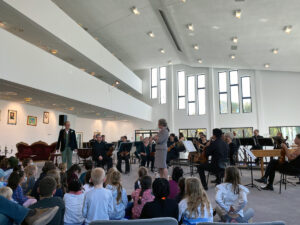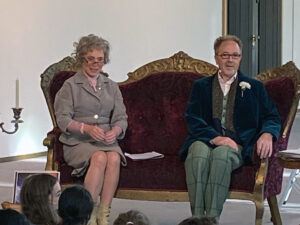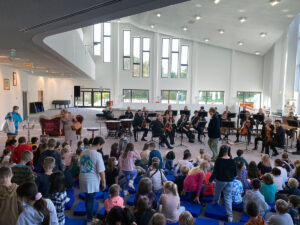“My language is understood all over the world”
Discovering the Life and Music of Joseph Haydn
“Meine Sprache versteht man durch die ganze Welt” – “My language is understood all over the world” was Joseph Haydn’s response to W.A.Mozart who said that he didn’t speak enough languages to travel to London.
The Austrian composer Joseph Haydn lived from 1732-1809. This was some time ago; do we still understand his “language” today? We went to find out!
 On Thursday, 27th October our learning partners of grade 2, 3 and 4 visited the Aalto Theatre to learn about Joseph Haydn. With a good dose of humour Fräulein Vorlaut and Professor Gisbert, two characters played by the opera singers Marie-Helen Joël and Michael Haag, as well as the Essener Philharmoniker lead us through J. Haydn’s life and his music. We heard anecdotes about Haydn’s life with plenty of music examples. We listened to funny stories and guessed the title of symphonies. Not only did we learn a lot of facts, but we also had the opportunity to experience a live orchestra in front of us. The event took place in the foyer of the Aalto Theatre; there you are very close to the performers on stage. We could see what the instruments looked like and how the musicians played them. Some of the students were surprised by the actual size of a real bassoon. They had seen videos and pictures, but that just wasn’t the same!
On Thursday, 27th October our learning partners of grade 2, 3 and 4 visited the Aalto Theatre to learn about Joseph Haydn. With a good dose of humour Fräulein Vorlaut and Professor Gisbert, two characters played by the opera singers Marie-Helen Joël and Michael Haag, as well as the Essener Philharmoniker lead us through J. Haydn’s life and his music. We heard anecdotes about Haydn’s life with plenty of music examples. We listened to funny stories and guessed the title of symphonies. Not only did we learn a lot of facts, but we also had the opportunity to experience a live orchestra in front of us. The event took place in the foyer of the Aalto Theatre; there you are very close to the performers on stage. We could see what the instruments looked like and how the musicians played them. Some of the students were surprised by the actual size of a real bassoon. They had seen videos and pictures, but that just wasn’t the same!

In preparation for the trip learning partners explored J. Haydn’s “Surprise Symphony”. They listened to it in full suspense and indeed they were all very surprised when they heard the first unexpected attack in the symphony. Students in grade 4 learned to play the famous theme including the surprise attack on xylophones.
Even though we were prepared for the trip, gathered facts about J.Haydn, listened to his music and played some of his famous themes, we still learned a lot more during our visit. Who knew that Mr Haydn composed symphonies that imitate chickens or a clock? Who knew that in his so-called “farewell” symphony musicians walk off the stage in the middle of the concert until only two players are left? Who knew that W.A.Mozart called J. Haydn “Papa”?
After this experience, do we believe that J. Haydn’s quotation is still true? Do we still understand his language? We think it is safe to say “yes”! We still got a big surprise hearing the timpani attack in the “surprise symphony”; we still thought it was funny that musicians would walk off the stage in the middle of a piece; we still heard the “clock” and the “chicken” in the symphonies called after them.

And have our learning partners to say about the trip?
- G2: “The trip was really fun!” (Loni)
- G3: “There wasn’t just talk, talk, talk, but we could also answer some questions and guess things!” (Raissa)
- “I liked the symphony called “The Clock”, because it was nice and quiet and it sounded like clocks ticking. I also liked the symphony “The Chicken” because it was funny and I liked how the instruments played it. I liked the bassoon, because it has a nice sound.” (Aylin)
- “I liked the symphony called “the Storm”, especially the thunder in it.” (Sheyanna)
- G4: “I liked to do the quiz and game after the trip to reflect on what we learned.” (Cara)
We really enjoyed the opportunity to explore music history in such an interesting way!
At the end of the event we were given a sheet about J.Haydn including a game and a quiz. Could you answer this question:
The melody of the German National Anthem was composed by J. Haydn.
Who did he originally compose it for?
- a) the Pope in Rome
- b) the English King
- c) the Austrian Emperor?
(check the end of the article for the correct answer)
.
.
.
.
.
.
.
.
.
correct answer: c)

